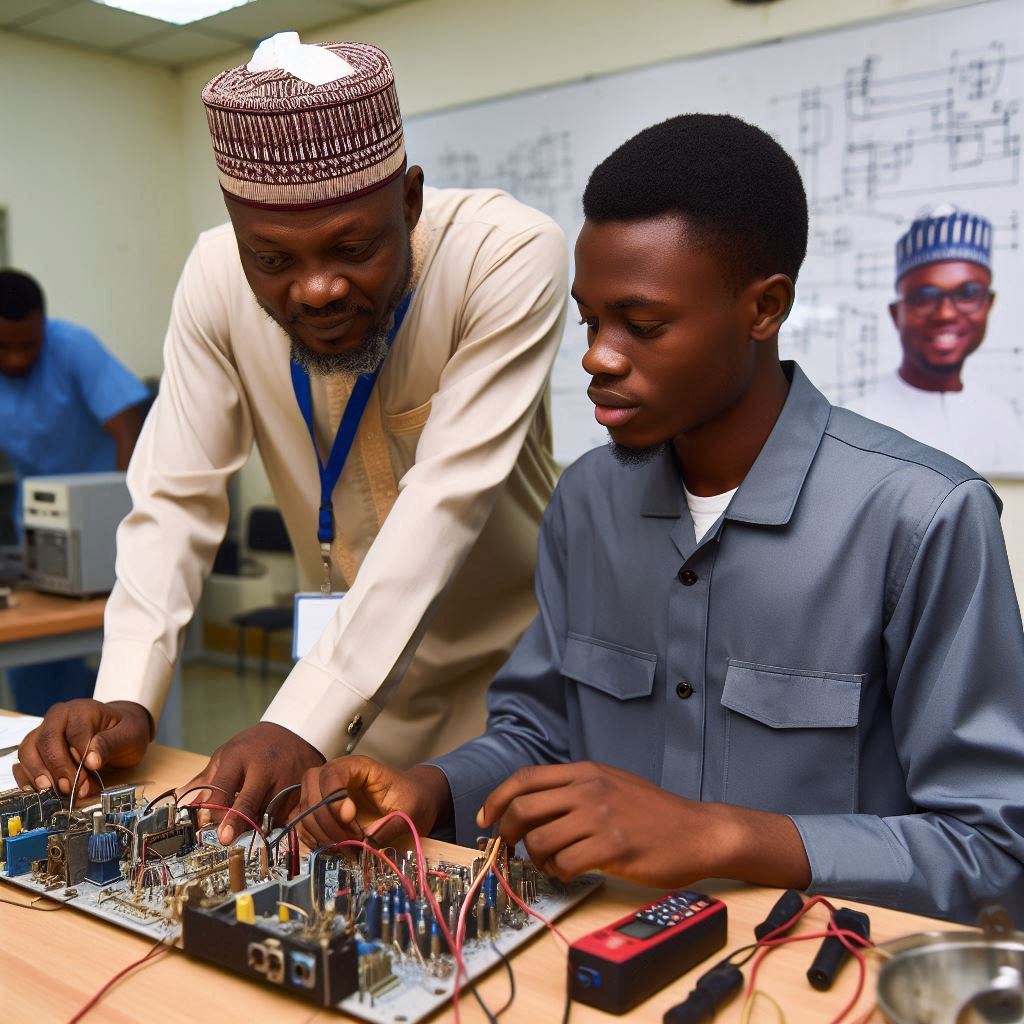Introduction
Technical education is crucial for the Nigerian economy. It equips individuals with practical skills necessary for various industries. This form of education goes beyond theoretical knowledge, focusing on hands-on experience. Technical Education Impact on Nigerian Economy
The Importance of Technical Education
Technical education plays a vital role in reducing unemployment. By providing job-ready skills, it bridges the gap between education and employment.
Many Nigerian youths benefit from these programs, gaining immediate employment after completion.
Furthermore, technical education boosts productivity. Skilled workers are more efficient and produce higher-quality work. This efficiency leads to increased outputs and, consequently, economic growth.
Relevance of Technical Skills
Technical skills are essential for industrialization. Nigeria aims to diversify its economy, reducing dependence on oil. A skilled workforce is necessary to achieve this goal, especially in manufacturing and technology sectors.
Moreover, technical education supports small and medium enterprises (SMEs). Many Nigerians run small businesses that benefit from technical skills.
For instance, electricians, mechanics, and IT technicians are in high demand. These skills help individuals start their own businesses, contributing to the economy.
Driving Economic Growth
The Nigerian economy benefits greatly from a technically skilled workforce.
With technical education, there is a reduction in the reliance on foreign experts. Locals with the necessary skills can handle complex projects, keeping funds within the country.
Technical education also attracts foreign investment. Investors seek locations with skilled labor to minimize training costs.
Nigeria’s investment in technical education makes it an attractive destination for foreign businesses.
Development Through Innovation
Innovation is another significant benefit of technical education. Skilled individuals are more likely to develop new products and services. This innovation drives economic growth and enhances the country’s global competitiveness.
Additionally, technical education promotes self-reliance. With the right skills, individuals can solve local problems. This independence reduces the need for foreign intervention, promoting national development.
Challenges and Solutions
Despite its importance, technical education in Nigeria faces challenges. Inadequate funding is a major issue, affecting the quality of education. To address this, the government must increase investment in technical education programs.
Another challenge is the outdated curriculum. The curriculum must be updated regularly to match industry needs. Collaboration between educational institutions and industries can ensure that the curriculum remains relevant.
In essence, technical education is vital for Nigeria’s economic growth and development. It reduces unemployment, boosts productivity, and supports industrialization.
With a skilled workforce, Nigeria can attract foreign investment and drive innovation.
Addressing challenges like inadequate funding and outdated curriculum is essential. By investing in technical education, Nigeria can secure a prosperous future.
Historical Background of Technical Education in Nigeria
Early Beginnings
Technical education in Nigeria dates back to colonial times. The British introduced formal education systems, focusing primarily on academic subjects. However, there was a growing need for skilled labor to support colonial infrastructure projects.
Post-Independence Development
After Nigeria gained independence in 1960, the government recognized the need for technical education.
This was crucial for economic growth and industrialization. Technical colleges and vocational schools were established to train skilled workers.
Establishment of Technical Institutions
The Federal Government established several technical institutions in the 1960s and 1970s. Notable among them were the Yaba College of Technology and Kaduna Polytechnic.
These institutions aimed to provide practical training and technical skills.
Growth and Expansion
During the oil boom of the 1970s, there was a significant expansion of technical education. New polytechnics and vocational centers were established across the country. This period saw a surge in the demand for skilled labor in various industries.
Technical Education Reforms
In the 1980s and 1990s, the Nigerian government introduced reforms to enhance technical education.
The National Board for Technical Education (NBTE) was created to regulate and standardize technical programs. These reforms aimed to improve the quality and relevance of technical training.
Role of Technical Institutions
Technical institutions have played a vital role in Nigeria’s economic development. They have provided a skilled workforce for various sectors, including manufacturing, construction, and technology.
Graduates from these institutions contribute significantly to the economy.
Impact on Industrialization
Technical education has been instrumental in Nigeria’s industrialization process. Skilled technicians and engineers have driven the growth of industries. This has led to increased productivity and economic diversification.
Contribution to Employment
Technical education has contributed to job creation in Nigeria. Many graduates from technical institutions find employment in various industries. This has helped reduce unemployment and poverty levels in the country.
Technical education has also fostered entrepreneurship in Nigeria. Many technical graduates start their businesses, contributing to the economy. They create jobs and innovate in different sectors.
Despite its successes, technical education in Nigeria faces challenges.
These include inadequate funding, outdated curricula, and insufficient infrastructure. However, there are opportunities to address these issues and further enhance technical education.
Future Prospects
The future of technical education in Nigeria looks promising. With continued government support and investment, technical institutions can produce a highly skilled workforce.
This will drive economic growth and development in the coming years.
Technical education has a rich history in Nigeria, evolving from colonial times to the present day. It has significantly impacted the economy by providing a skilled workforce, supporting industrialization, and fostering entrepreneurship.
Addressing current challenges can unlock even greater potential for technical education in Nigeria’s economic future.
Read: Curriculum Studies Scholarships in Nigeria
Current State of Technical Education in Nigeria
Technical education in Nigeria plays a crucial role in shaping the economy by supplying skilled manpower. However, its current state presents a mixed picture of challenges and opportunities.
Despite efforts to promote technical education, there are notable disparities in infrastructure and resources among institutions. These disparities hinder uniformity in educational standards across the country.
Government policies aimed at revitalizing technical education have shown some progress, yet implementation remains inconsistent. Lack of sustained funding often disrupts planned improvements in curriculum and facilities.
Challenges Faced by Technical Institutions
- Infrastructure Deficiency: Many technical institutions in Nigeria suffer from inadequate infrastructure such as outdated workshops and laboratories. This shortfall limits practical training opportunities for students.
- Shortage of Qualified Staff: A significant challenge is the shortage of qualified instructors. The demand for skilled personnel often exceeds the availability, leading to compromised learning experiences.
- Relevance of Curriculum: The curriculum in many technical institutions requires updating to meet current industry demands. Outdated courses do not equip graduates with the skills needed in today’s job market.
- Funding Constraints: Financial support for technical education is inconsistent. This affects the maintenance of facilities, procurement of modern equipment, and overall educational quality.
- Perception and Stigma: Technical education is sometimes undervalued compared to academic education, leading to a stigma against pursuing technical careers. This perception limits enrolment and societal support.
Addressing the Challenges
To improve the state of technical education in Nigeria, several strategies can be considered:
- Increased Funding Allocation: Government and private sector partnerships can enhance funding for infrastructure development and staff training.
- Curriculum Review and Industry Collaboration: Regular review of curricula in consultation with industries ensures graduates are equipped with relevant skills.
- Enhanced Staff Recruitment and Training: Initiatives to attract and retain qualified instructors through competitive salaries and continuous professional development.
- Public Awareness Campaigns: Promoting the importance of technical education in economic development can shift societal perceptions and increase enrolment.
The current state of technical education in Nigeria reflects both challenges and opportunities.
While efforts are being made to improve infrastructure, curriculum, and staff quality, persistent issues such as funding gaps and societal attitudes remain barriers to achieving excellence.
Addressing these challenges requires sustained commitment from government, industry stakeholders, and educational institutions.
By investing in technical education, Nigeria can effectively equip its workforce with the skills needed to drive economic growth and innovation in the modern global economy.
Read: Practical Training in Counsellor Education Programs
Impact of Technical Education on the Nigerian Economy
Technical education plays a pivotal role in shaping Nigeria’s economic landscape by enhancing human capital and fostering innovation, entrepreneurship, and job creation.
This section explores the multifaceted impact of technical education on the nation’s economy.
Enhancing Human Capital Development
Technical education equips individuals with specialized skills that are directly applicable in various industries.
By focusing on practical knowledge and hands-on experience, technical institutions produce graduates who are adept at solving real-world problems.
These graduates fill crucial gaps in sectors such as engineering, information technology, and manufacturing.
They bring practical expertise that drives operational efficiency and quality standards in businesses across Nigeria.
Fostering Innovation and Entrepreneurship
Technical skills are essential catalysts for innovation. In a rapidly evolving global economy, Nigerian industries require constant innovation to remain competitive.
Technical education nurtures a culture of creativity and problem-solving among students.
Entrepreneurship flourishes as technical graduates often possess the skills needed to start and manage businesses.
They innovate new products, services, and processes, thereby contributing to economic diversification and growth.
Job Creation and Economic Growth
The direct correlation between technical education and job creation cannot be overstated. Industries seek skilled professionals capable of driving productivity and technological advancement.
Technical graduates fulfill these roles, reducing unemployment rates and boosting economic output.
Moreover, the entrepreneurial ventures initiated by technical graduates create job opportunities for others. This ripple effect stimulates local economies and enhances overall socio-economic development.
Case Study: Impact in Specific Sectors
Examining sectors like telecommunications and construction reveals the profound impact of technical education.
Engineers, technicians, and skilled workers trained through technical programs form the backbone of these industries.
Transform Your Career with Expert Guidance
Get personalized mentorship consulting that’s tailored to your unique path. Our expert advice is actionable and exclusive.
Get StartedFor instance, telecommunications advancements rely on skilled technicians to maintain infrastructure and develop new technologies.
Similarly, construction projects benefit from the expertise of civil engineers and skilled tradesmen trained in technical institutes.
Challenges and the Way Forward
Despite its benefits, technical education in Nigeria faces challenges such as inadequate funding, outdated curricula, and a mismatch between industry needs and educational outcomes.
Addressing these issues requires collaborative efforts among government, educational institutions, and industries.
Reforms should focus on curriculum modernization, industry partnerships, and investment in state-of-the-art facilities.
Aligning technical education with emerging technologies and global industry standards is crucial for sustaining its impact on the economy.
In a nutshell, technical education serves as a cornerstone of Nigeria’s economic development strategy.
By enhancing human capital, fostering innovation, and creating job opportunities, it contributes significantly to economic growth and societal advancement.
To maximize its impact, continuous investment in technical education is essential. This investment not only prepares individuals for current industry demands but also ensures Nigeria remains competitive in a globalized economy.
Technical education isn’t just about imparting skills; it’s about building a foundation for sustainable economic prosperity.
Read: Professional Certifications in Business Education

Case Studies and Success Stories
In Nigeria, technical education has catalyzed remarkable success stories across various sectors, underscoring its pivotal role in economic advancement.
These case studies vividly illustrate how technical skills have transformed individuals and companies, thereby contributing significantly to the national economy.
Aliko Dangote: The Industrial Mogul
Aliko Dangote, Africa’s richest man, epitomizes the transformative power of technical education in Nigeria. Armed with a background in engineering, Dangote leveraged his technical expertise to establish the Dangote Group.
Today, his conglomerate spans industries such as cement, sugar, and petroleum refining, contributing immensely to employment and GDP growth.
Innoson Motors: Driving Innovation in Automotive Industry
Innoson Motors stands as a testament to how technical education can spur innovation and competitiveness in local manufacturing.
Founded by Innocent Chukwuma, a graduate in technical studies, the company has become Nigeria’s first indigenous automaker.
Through its production of vehicles locally, Innoson Motors has not only created jobs but has also reduced Nigeria’s dependence on imported vehicles.
Andela: Revolutionizing Tech Talent Development
Andela, a tech company founded by Nigerian entrepreneurs, has revolutionized software development by training African engineers in collaboration with global tech firms.
By equipping young Nigerians with technical skills in software engineering, Andela has enhanced Nigeria’s position as a hub for tech innovation.
This initiative not only addresses the global demand for skilled developers but also contributes to the country’s ICT sector growth.
MTN Nigeria: Telecom Giant’s Technical Expertise
MTN Nigeria, a leading telecommunications company, has harnessed technical education to expand its network infrastructure and services across the country.
Through continuous investment in technical training and development programs for its workforce, MTN has enhanced connectivity and digital inclusion in Nigeria.
This has spurred economic activities in sectors reliant on telecommunications, such as e-commerce, financial services, and agriculture.
Julius Berger: Engineering Excellence in Infrastructure
Julius Berger Nigeria PLC, renowned for its expertise in construction and engineering, exemplifies how technical education underpins infrastructure development.
With a workforce skilled in civil engineering and related technical disciplines, Julius Berger has undertaken significant projects including roads, bridges, and buildings critical to Nigeria’s economic growth.
The company’s contribution extends beyond construction to capacity building and knowledge transfer, further bolstering the local economy.
Impact on Various Sectors
Across these case studies, the impact of technical education resonates deeply within multiple sectors of the Nigerian economy.
The integration of technical skills not only drives innovation and entrepreneurship but also enhances productivity, efficiency, and global competitiveness.
In review, the success stories of individuals like Aliko Dangote, companies such as Innoson Motors and Andela, and entities like MTN Nigeria and Julius Berger underscore the transformative potential of technical education in Nigeria.
By nurturing a skilled workforce capable of addressing industry demands, technical education remains a cornerstone of economic development, ensuring sustainable growth and prosperity for the nation.
As Nigeria continues to embrace technological advancements, the role of technical education in shaping its future economy cannot be overstated.
Read: Scholarships for Counsellor Education Students
Government Policies and Support for Technical Education in Nigeria
In Nigeria, government initiatives and policies play a crucial role in shaping the landscape of technical education.
These policies are designed to promote the growth and sustainability of technical institutions across the country, aiming to bolster economic development through skilled workforce empowerment.
Initiatives to Promote Technical Education
Government initiatives such as the National Policy on Education (NPE) emphasize the importance of technical and vocational education as a means to equip individuals with practical skills for employment and entrepreneurship.
The NPE sets guidelines and standards for the establishment and accreditation of technical institutions, ensuring quality and relevance in education.
Challenges in Implementation
However, despite these policies, challenges persist in the effective implementation of technical education programs.
Issues such as inadequate funding, outdated curricula, and a lack of modern equipment and facilities hinder the full realization of the potential impact of technical education on the economy.
Need for Increased Funding
One of the most pressing needs is increased funding for technical education. Adequate financial support is essential to upgrade infrastructure, procure state-of-the-art equipment, and attract qualified instructors.
Without sufficient funding, technical institutions struggle to maintain relevance and competitiveness in a rapidly evolving global economy.
Infrastructure Development
Infrastructure development is another critical area requiring government attention. Many technical institutions in Nigeria suffer from dilapidated buildings, inadequate classrooms, and insufficient workshop facilities.
Addressing these infrastructure deficits is essential to creating a conducive learning environment that fosters innovation and practical skill development.
Capacity Building
Moreover, capacity building for both students and instructors is paramount. Continuous training and development programs ensure that educators are equipped with up-to-date knowledge and teaching methodologies.
Similarly, students benefit from enhanced learning experiences that prepare them for the demands of the job market.
Aligning Education with Industry Needs
A key aspect of effective technical education policy is aligning curriculum with industry needs.
Close collaboration between educational institutions and industries helps tailor programs to current market demands, ensuring graduates are employable and capable of driving economic growth.
In fact, while government policies and initiatives aimed at promoting technical education in Nigeria are commendable, there is a clear need for enhanced implementation strategies.
Increased funding, infrastructure development, and capacity building are essential to elevate technical education to a level where it significantly contributes to economic development.
By addressing these areas, Nigeria can harness the full potential of its human capital, fostering innovation, entrepreneurship, and sustainable economic growth through a skilled and empowered workforce.
By focusing on these critical areas, Nigeria can build a robust technical education sector that meets both domestic needs and global standards, thereby laying a solid foundation for a prosperous future driven by innovation and technical expertise.
Conclusion
In this blog post, we have explored the pivotal role of technical education in Nigeria’s economic landscape.
Technical education, encompassing practical skills and vocational training, emerges as a potent catalyst for sustainable economic development.
By equipping individuals with specialized skills and knowledge, technical education addresses critical gaps in the labor market. This, in turn, enhances productivity and efficiency across various sectors of the economy.
Summarizing Key Points
Throughout our discussion, we highlighted several key points:
- Skill Development: Technical education fosters the development of practical skills crucial for industries such as engineering, manufacturing, and information technology.
- Employability: Graduates of technical institutions are better prepared to meet the demands of the job market, reducing unemployment rates.
- Entrepreneurship: It encourages entrepreneurship by nurturing innovative thinking and problem-solving abilities among students.
- Industrial Growth: Technical education supports industrial growth by supplying a skilled workforce that can drive technological advancements and innovation.
- Global Competitiveness: Countries with robust technical education systems often exhibit higher levels of global competitiveness.
Importance of Investing in Technical Education
Investing in technical education is not merely an option but a necessity for Nigeria’s economic prosperity. As the nation strives to diversify its economy away from oil dependency, technical skills become increasingly crucial.
These skills underpin sectors like agriculture, healthcare, construction, and renewable energy, which are pivotal for sustainable development.
Economic Sustainability
Furthermore, technical education promotes economic sustainability by:
- Meeting Market Demands: Aligning education with market needs ensures a steady supply of skilled workers.
- Reducing Poverty: Equipping individuals with technical skills empowers them to secure higher-paying jobs, lifting families out of poverty.
- Innovation and Research: It stimulates innovation and research, crucial for adapting to global trends and fostering indigenous technological advancements.
To harness these benefits fully, stakeholders—government, private sector, educational institutions, and civil society—must collaborate.
Policy reforms should prioritize technical education, ensuring quality curriculum, modern infrastructure, and partnerships with industries.
Scholarships and grants should be expanded to increase access to technical education, particularly for marginalized groups and rural communities.
In closing, investing in technical education is not just an investment in individuals but in the future of Nigeria’s economy.
It lays the foundation for a skilled workforce capable of driving economic growth, fostering innovation, and enhancing global competitiveness.
As other economies embrace technological advancements, Nigeria must not lag behind but lead the charge towards a prosperous and sustainable future through robust technical education.




